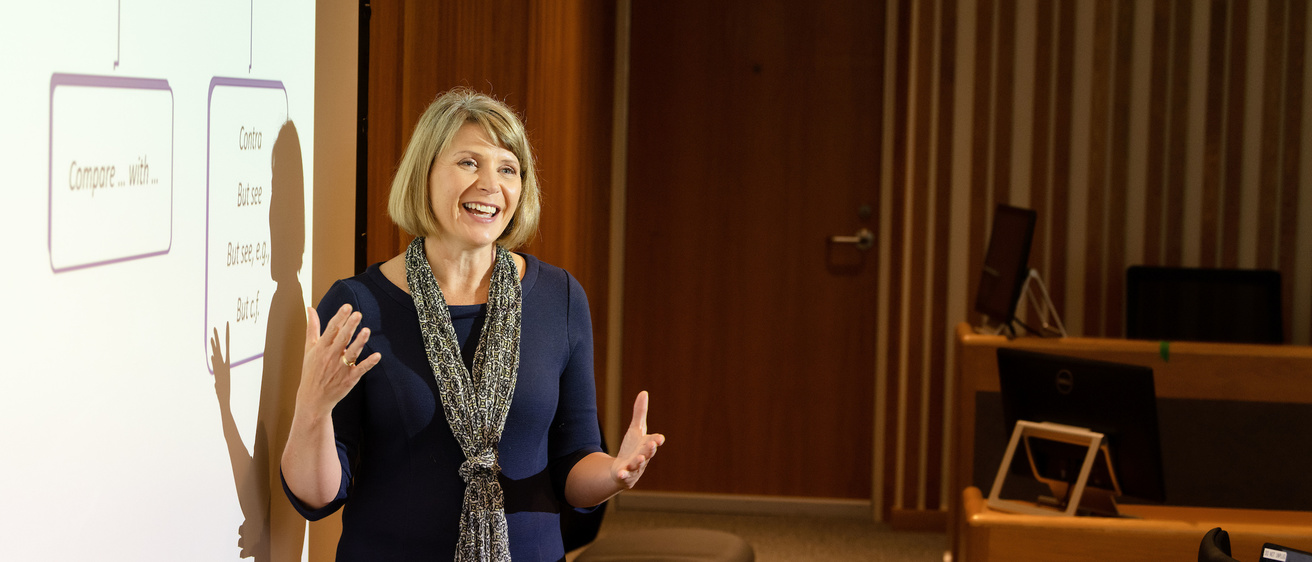Iowa Law has long been at the forefront of legal writing education. Although the program has evolved over time, current students and alumni alike attest that the emphasis on one-on-one instruction and consistent feedback sets the Iowa Law writing program apart and teaches the art and science of legal writing needed for success in practice.

It’s fair to say that Judge Kevin G. Ross (94JD) of the Minnesota Court of Appeals — who has authored around 1,000 full court opinions and also can opine with fervor about finer style points like the pros and cons of the use of “they” as a singular pronoun in formal writing — is a legal writing enthusiast. But he claims that was not always the case.
“I thought I was a very good writer when I applied to law school,” he recalls. Looking back after he completed a federal clerkship, he believes, “I wasn’t such a great writer after all.” Even now, with more than 15 years on the bench, he notes, “I’m constantly developing” legal writing skills.
“I was encouraged at Iowa Law by law professors with a singular passion for good writing,” Ross says. He praises the “emphasis Iowa put on writing and the requirements to do lots of it.”
Emphasis placed on individualized attention

According to Dawn Barker Anderson (95JD), professor of Legal Analysis, Writing & Research (LAWR) and director of the Writing & Academic Success Center, when the law school founded its Writing Center more than three decades ago in 1989, it was one of the first programs of its kind.
In 2006, the law school revamped its legal writing program again to the format students encounter today. What has remained is the emphasis on individual feedback that helped Ross develop his writing when he was a student.
“We’re just really giving people a tremendous amount of one-on-one feedback,” notes LAWR Professor Chris Liebig. “I’d be surprised if any law student anywhere is getting more feedback.”
Every first-year student takes 2 credits dedicated to legal writing in the first semester and 3 in the second semester. Students in each first-year legal writing section complete a legal memo and a brief. Liebig believes this combination allows students to develop skills in predictive analysis using an objective tone for the memo and advocacy for the brief. Beyond those basic projects, Liebig says the law school allows LAWR professors to establish their own substantive curriculum and take ownership of their teaching style using their own backgrounds and expertise.
According to Anderson, Iowa Law has more full-time dedicated writing professors than all of the top-5 law schools combined.
Liebig has seen much of the evolution of the Iowa Law writing program. He moved to Iowa 25 years ago to attend the University of Iowa Writers’ Workshop. Liebig, a Harvard-educated litigator, was offered a work-study position with the Iowa Law writing center and soon after that began teaching contracts and legal writing.
Liebig notes that Iowa Law developed its small section program, including intensive writing training, in the 1960s and 70s. At the time, only Yale offered a similar program.
Writing & Academic Success Center supports student writers
The dedicated legal writing program at Iowa Law dovetails with other offerings at the school. For example, students in experiential programs often need to use their developing legal writing skills. In fact, Liebig supervises students in one of the experiential programs.
In addition to the LAWR program, Anderson is the head of the Writing & Academic Success Center, which provides resources that complement LAWR. For example, upper-level students can receive coaching from the center while they are working on briefs for their appellate advocacy course, journal articles, or writing samples for clerkship applications.
Law Library grounds writing in authority
The University of Iowa Law Library also contributes to the success of the school in preparing future legal writers. Many students at the school conduct research for professors, as well as working for clinics and writing their own journal articles, and Carissa Vogel, director of the Law Library, notes, “We have to ground this in authority.”
Vogel notes that a high number of library staff have both a JD and master’s degree in library science, including 5 who teach legal research and serve as liaisons with the LAWR faculty.
Vogel notes that the law school’s focus on writing is a natural offshoot of the university generally, particularly the Writers’ Workshop. “There’s a tradition of great care and craft in writing,” she says. “It’s not something that just happens.”
Students participate in top-ranked journals
Anderson also points to the high percentage of Iowa Law students who write on one of the school’s four student-run journals.
Before starting law school, second-year student Kate Conlow had worked for a decade as a writer and editor.

“I am the first lawyer in my family and I had no idea what law was. I thought it was trial law like I had seen on television — which to be honest was pretty intimidating,” she notes. In November 2019, “totally on a whim,” she attended an Iowa Law open house that changed her perspective. The practice of law includes many of the things she enjoyed about her prior career, like creative thinking and analysis.
Still, “the approach is entirely different. In legal writing, you have to be concise and get really complicated legal theories put together in a way that communicates and convinces,” Conlow notes.
Currently, Conlow is a student writer on the Iowa Law Review, which has been ranked number 12 out of more than 400 journals in the W&L Law Journal Rankings. Two other Iowa Law journals rank in the top 5 in their subject matter.
“I love legal research and writing,” Conlow says, “and I intend to take as many classes as I can going forward that have a writing component, as well as to continue writing after I graduate.”
Writing education leads to career success
Ross compares a judicial clerkship to a “master’s degree in legal writing” that requires a solid foundation in the basics of the craft. “From what I’ve seen, the Iowa Law students who I’ve hired as law clerks are well-situated to continue to progress” as legal writers.
“Our students compare favorably to whatever lawyer or law student they’re working with,” Anderson says. “The quality of writing really sets them apart.”
